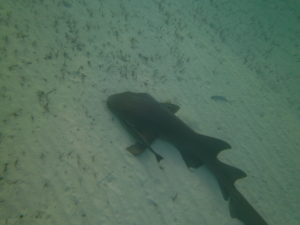Travel agents are supposed to promote the positive image of travel, give solid recommendations based on first-hand knowledge, extensive ongoing training as well as leverage their professional connections of other trusted agents experience so that they can share a wealth of knowledge to improve their client’s vacation all delivered with the enthusiasm of a Texas cheerleader. This is easy to do, most times – It’s travel. We love travel. I mean we really love travel. We love learning about people and places, the latest trend, the most exciting adventures or we wouldn’t be in this business; there are however some incidences where I think travelers have a duty, yes I said duty, to speak out against practices that damage the very environment they came on vacation to enjoy. Shark protection is one of those issues.
To be honest, travel agents as a group have been reluctant to pass on their knowledge of practices that are damaging to the environment, or any other negative or controversial practice.
It goes to the core of what we sell: vacations infused with happy memories. Real life tropical postcards with beaches so pretty a single glance at a photo in December will carry you back to the feel of the sun basting your relaxed body, the saltiness resting on your lips, the hint of perfume released by brightly colored flowers in yellow, red and orange mixing with the sea air. Vacation isn’t just a destination, it is the one time of the year that you don’t have to worry about the electric bill, whether to recycling or not, what you want to do balanced against what you must do. Merriam Webster defines vacation as 1: a respite or a time of respite from something. That something surely includes a respite from decisions -while on vacation all I want to do is decide if I feel like a Mojito or perhaps something new with my lunch. Difficult, complicated and most of all, moral decisions are not something I come on vacation to ponder. So make this decision now, while you are not on vacation and keep your vacation a respite for your mind and soul while helping to ensure next year, next decade and next century others can follow your footsteps.
Top Five Things YOU can do to Help Save Sharks
1. Educate yourself about sharks. The shark conservation movement requires informed, intelligent advocates.
2. Do not use products made from sharks. Most shark conservation organizations will tell you not to eat shark fin soup, I would go further and recommend walking out of any restaurant that even serves shark fin soup, right after you tell the manager why you are leaving.
3. Do not eat seafood that results in the bycatch of sharks. The longline fishery in the North Atlantic kills 5 sharks for every swordfish caught. Find out if the food you are eating kills sharks. If it does, eat something else. Monterey Bay Aquarium has a great App called Seafood Watch that tells you what seafood is healthy and sustainable. Download it. Use it.
4. Support Shark Ecotourism. On your next vacation, visit one of the countries that have taken steps to protect their shark populations. Go dive with the tiger sharks in The Bahamas, the Caribbean reef sharks of Roatan, Honduras, or the grey reef sharks at Blue Corner in the Rock Islands, Palau.
5. Choose Dive Operators that do not bait sharks! This is a tough one, if you want to see sharks, dive operators routinely bait the water to draw them in, but humans hanging around bait with sharks, isn’t a good idea. If we teach sharks to associate us with food, and they oblige us – exactly who is to blame.



